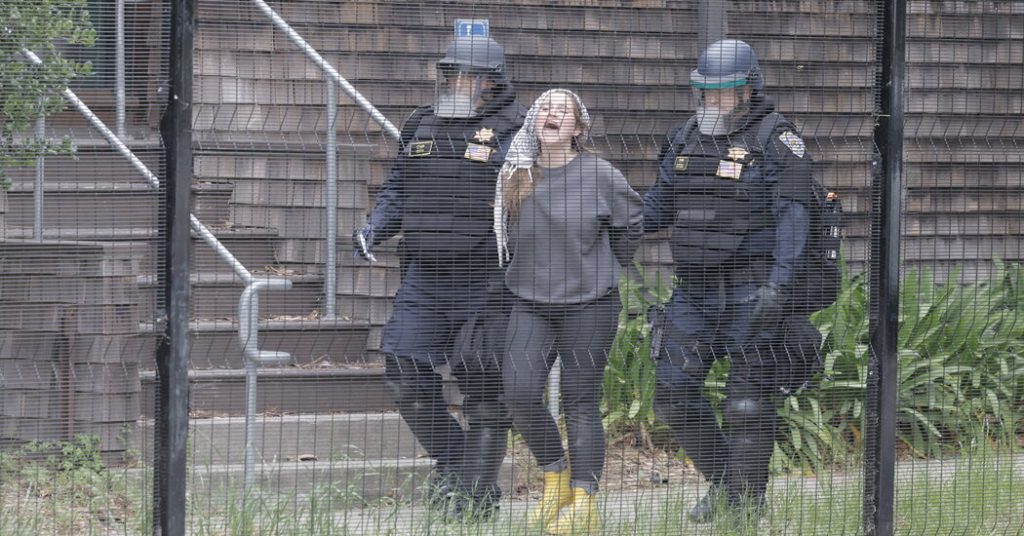A group of pro-Palestinian protesters at the University of California, Berkeley set up a new encampment at the Anna Head complex after dismantling a larger camp earlier in the week. The protesters hung Palestinian flags and spray-painted the area as they gathered at the fire-damaged structure near People’s Park. The California Highway Patrol, along with local police and sheriff’s departments, surrounded the area on Thursday night and ordered the protesters to disperse within 30 minutes or face arrest. At least 12 people were arrested, and it was expected that more would be taken into custody.
University spokesman Dan Mogulof stated that it was unclear how many of the protesters were U.C. Berkeley students. Prior to the arrests, protesters had reached a tentative agreement with the university chancellor, Carol Christ, to dismantle the larger encampment at Sproul Plaza. As part of the agreement, the university agreed to begin discussions around divestment from certain companies and to support efforts to secure an immediate and permanent cease-fire by the end of the month. However, Chancellor Christ clarified that divesting from companies that do business with or in Israel was not within her authority.
The raid of the new encampment at the Anna Head complex came after protesters chose to occupy the area following the dismantling of the larger camp. Some protesters remained inside the complex overnight, while others camped outside in tents with Palestinian flags on display. The police presence grew around 6:30 p.m. on Thursday when officers began surrounding the area and using bullhorns to warn the protesters of potential arrest if they did not disperse. The number of arrests increased throughout the evening as protesters were taken into custody.
The situation at U.C. Berkeley involving pro-Palestinian protesters has been ongoing, with demonstrations and encampments happening on campus. The actions of the protesters and subsequent arrests have garnered attention and raised questions about free speech, protest rights, and the university’s response to the situation. The agreement reached between protesters and Chancellor Christ highlighted the complex nature of the conflict and the challenges in addressing the issues raised by the protesters. The arrests at the Anna Head complex marked a continuation of the tensions between the protesters and university officials.
The involvement of multiple law enforcement agencies, including the California Highway Patrol and local police and sheriff’s departments, in the raid on the encampment demonstrates the seriousness with which the situation was handled. The arrests of multiple protesters further escalated the tension and raised concerns about the handling of protests on campus. The response to the protests by university officials, including Chancellor Christ, has been closely monitored, with potential implications for the ongoing conflict and future demonstrations. The events at U.C. Berkeley reflect broader discussions around the Israeli-Palestinian conflict and the role of universities in addressing complex political issues.
In conclusion, the raid on the pro-Palestinian encampment at U.C. Berkeley’s Anna Head complex and the subsequent arrests of protesters have brought attention to the ongoing conflict on campus. The agreement reached between protesters and university officials, and the subsequent dismantling of the larger encampment, set the stage for further tensions and protests. The involvement of multiple law enforcement agencies in the raid added to the complexity of the situation, while the response from Chancellor Christ highlighted the challenges in addressing the demands of the protesters. The events at U.C. Berkeley underscore the ongoing discussions around free speech, protest rights, and the Israeli-Palestinian conflict within the university community.







